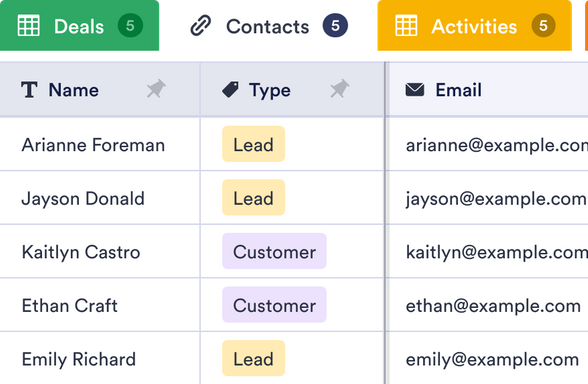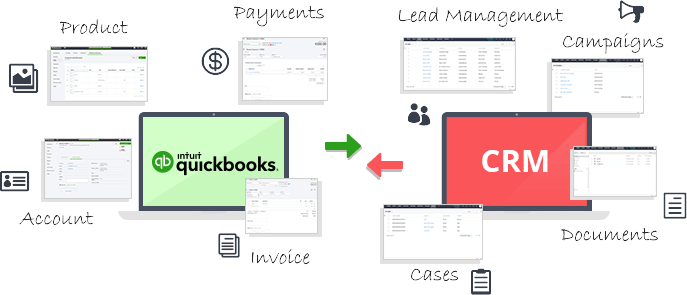Unlock Growth: The Ultimate Guide to Easy CRM Solutions for Small Businesses

Introduction: Why Your Small Business Needs a CRM, and Why It Doesn’t Have to Be Complicated
Running a small business is a whirlwind. You’re juggling a million things: product development, marketing, sales, customer service, and, of course, keeping the finances in order. In the midst of all this, it’s easy for customer relationships to fall by the wayside. That’s where a Customer Relationship Management (CRM) system comes in. Think of it as your central hub for everything customer-related. It helps you organize your contacts, track interactions, manage leads, and ultimately, close more deals. But the thought of implementing a CRM can be daunting, especially for small businesses with limited resources and technical expertise. The good news? It doesn’t have to be a complex, expensive, or time-consuming process. This guide is your roadmap to understanding and implementing an easy CRM solution that will supercharge your small business.
We’ll explore the benefits of CRM, the features you should look for, and, most importantly, how to choose and implement a user-friendly CRM system that fits your specific needs. We’ll also delve into practical tips and tricks to maximize its impact, helping you build stronger customer relationships and drive sustainable growth. Forget the complicated, enterprise-level systems. We’re focusing on simplicity, affordability, and ease of use – the perfect recipe for small business success. So, let’s dive in and discover how an easy CRM can transform your business.
The Power of CRM: Why It’s Essential for Small Business Success
Before we jump into the specifics of easy CRM solutions, let’s quickly review the core reasons why a CRM is so crucial for small businesses. It’s not just about keeping track of contact information; it’s about building meaningful relationships that lead to lasting customer loyalty and increased revenue. Here are some key advantages:
- Improved Customer Relationships: A CRM provides a 360-degree view of your customers. You can see their purchase history, communication logs, and any other relevant information in one place. This allows you to personalize your interactions, anticipate their needs, and provide exceptional customer service.
- Increased Sales: CRM systems help you manage your sales pipeline, track leads, and identify opportunities. By automating tasks and providing insights into customer behavior, you can close more deals and boost your sales performance.
- Enhanced Efficiency: CRM systems automate many time-consuming tasks, such as data entry, email marketing, and appointment scheduling. This frees up your team to focus on more strategic activities, like building relationships and closing deals.
- Better Data Analysis: CRM systems provide valuable data and analytics, allowing you to track your sales performance, identify trends, and make data-driven decisions. You can see which marketing campaigns are most effective, which products are selling well, and which customers are most valuable.
- Improved Collaboration: CRM systems facilitate collaboration among your team members. Everyone has access to the same customer information, so they can work together more effectively to provide a seamless customer experience.
In short, a CRM system empowers you to work smarter, not harder. It allows you to centralize your customer data, streamline your processes, and build stronger relationships, ultimately leading to increased revenue and sustainable growth. Ignoring the power of a CRM in today’s competitive landscape is like trying to navigate a maze blindfolded. It’s possible, but significantly more difficult and less likely to succeed.
Key Features to Look for in an Easy CRM Solution
Now that we understand the ‘why’ of CRM, let’s explore the ‘what.’ What features should you look for in an easy-to-use CRM, especially if you’re a small business with limited resources? Here are the essential components:
- Contact Management: This is the foundation of any CRM. It allows you to store and manage all your customer contact information, including names, addresses, phone numbers, email addresses, and social media profiles. Look for a system that allows you to easily import contacts, segment them into groups, and add custom fields to capture specific information relevant to your business.
- Lead Management: A good CRM will help you track and nurture leads throughout the sales process. This includes capturing lead information, assigning leads to sales reps, tracking lead activity, and automating follow-up emails. Look for features like lead scoring, which helps you prioritize your efforts by identifying the most promising leads.
- Sales Pipeline Management: This feature allows you to visualize your sales process and track the progress of your deals. You can see where each deal stands in the pipeline, identify potential bottlenecks, and forecast your sales revenue. Look for a system that allows you to customize your sales stages to match your specific sales process.
- Task Management and Reminders: An easy CRM should help you stay organized and on top of your tasks. This includes the ability to create tasks, assign them to team members, set deadlines, and receive reminders. This is critical for ensuring that you follow up with leads and customers in a timely manner.
- Email Integration: Integrating your CRM with your email provider is essential for streamlining your communication. This allows you to send and track emails directly from your CRM, log email activity automatically, and see a complete history of your interactions with each customer.
- Reporting and Analytics: A good CRM will provide you with valuable insights into your sales performance and customer behavior. Look for features like sales reports, lead source analysis, and customer segmentation. This data will help you make data-driven decisions and improve your sales and marketing efforts.
- Mobile Accessibility: In today’s fast-paced world, it’s essential to have access to your CRM on the go. Look for a CRM that offers a mobile app or a responsive web interface that allows you to access your data and manage your tasks from your smartphone or tablet.
- Integration Capabilities: Consider whether the CRM integrates with other tools you already use, such as your email marketing platform, accounting software, or social media channels. Integration can save you time and effort by automating data transfer and streamlining your workflows.
While these features are crucial, remember that the best CRM for your small business is the one that fits your specific needs and is easy for your team to use. Don’t get bogged down in features you don’t need. Focus on the core functionalities that will make the biggest impact on your sales and customer relationships.
Choosing the Right Easy CRM: Key Considerations
Selecting the right CRM can feel overwhelming, but breaking it down into manageable steps will make the process much smoother. Here’s a guide to help you make the right choice:
- Define Your Needs: Before you start shopping, take some time to assess your business needs. What are your primary goals for implementing a CRM? What are your current pain points? What features are essential for your business? Creating a list of your must-haves and nice-to-haves will help you narrow down your options.
- Consider Your Budget: CRM systems come in a variety of price points, from free to enterprise-level. Determine how much you’re willing to spend on a CRM and look for options that fit within your budget. Remember to factor in the cost of implementation, training, and ongoing support.
- Evaluate Ease of Use: This is perhaps the most critical factor for small businesses. Look for a CRM that is intuitive, user-friendly, and easy to navigate. Consider whether the system offers a clean interface, drag-and-drop functionality, and helpful tutorials.
- Assess Scalability: As your business grows, your CRM needs will evolve. Choose a CRM that can scale with your business. Consider whether the system can handle an increasing number of contacts, users, and data.
- Research Integrations: As mentioned earlier, integrations are important. Does the CRM integrate with the other tools you use, such as your email marketing platform, accounting software, and social media channels?
- Read Reviews and Get Recommendations: Research different CRM systems and read reviews from other small businesses. Ask for recommendations from your network, including other business owners, consultants, and industry experts.
- Take Advantage of Free Trials: Most CRM providers offer free trials. Take advantage of these trials to test out different systems and see which one best fits your needs. This is the best way to evaluate ease of use and functionality.
- Consider Customer Support: Make sure the CRM provider offers adequate customer support. Look for options like email support, phone support, and online documentation.
By following these steps, you can narrow down your choices and select a CRM that’s the perfect fit for your small business.
Top Easy CRM Solutions for Small Businesses: A Comparative Overview
Now that you know what to look for, let’s explore some of the top easy CRM solutions for small businesses. We’ll focus on systems that are known for their user-friendliness, affordability, and suitability for small business needs. Note that pricing and features are subject to change, so always check the provider’s website for the most up-to-date information.
1. HubSpot CRM
Overview: HubSpot CRM is a popular, all-in-one CRM platform that offers a free version with a robust set of features. It’s known for its user-friendly interface, comprehensive features, and excellent marketing automation capabilities.
Key Features:
- Free CRM with unlimited contacts and users.
- Contact management, deal tracking, and task management.
- Email marketing and marketing automation tools.
- Sales pipeline management and reporting.
- Integrations with other popular tools.
- User-friendly interface and excellent support.
Pros:
- Completely free version with great functionality.
- Intuitive and easy to learn.
- Excellent marketing automation capabilities.
- Strong integration capabilities.
Cons:
- The free version has limitations on some features.
- Can become expensive as you scale and need more advanced features.
2. Zoho CRM
Overview: Zoho CRM is a comprehensive CRM platform that offers a range of plans to suit different business needs. It’s known for its affordability, customization options, and wide range of integrations.
Key Features:
- Contact management, lead management, and sales pipeline management.
- Workflow automation and email marketing.
- Reporting and analytics.
- Mobile app for iOS and Android.
- Extensive integration capabilities.
Pros:
- Affordable pricing plans.
- Highly customizable.
- Wide range of integrations.
- Good customer support.
Cons:
- The user interface can be slightly overwhelming for beginners.
- Some advanced features require a higher-tier plan.
3. Freshsales
Overview: Freshsales is a sales-focused CRM that’s designed to be easy to use and get started with. It’s known for its intuitive interface, sales automation features, and affordable pricing.
Key Features:
- Contact management and lead management.
- Sales pipeline management and deal tracking.
- Built-in phone and email integration.
- Workflow automation and reporting.
- User-friendly interface and excellent support.
Pros:
- User-friendly and easy to set up.
- Strong sales automation features.
- Affordable pricing.
- Good customer support.
Cons:
- Fewer integrations compared to some other CRM systems.
- Some advanced features require a higher-tier plan.
4. Pipedrive
Overview: Pipedrive is a sales-focused CRM that’s designed to help sales teams manage their deals and close more sales. It’s known for its visual pipeline, intuitive interface, and focus on sales productivity.
Key Features:
- Visual sales pipeline management.
- Contact management and lead management.
- Deal tracking and sales automation.
- Reporting and analytics.
- Mobile app for iOS and Android.
Pros:
- Excellent visual pipeline.
- Intuitive and easy to use.
- Focus on sales productivity.
Cons:
- Limited marketing automation features.
- Some features require a higher-tier plan.
5. Agile CRM
Overview: Agile CRM is a versatile CRM platform that offers a free plan and a range of features to suit different business needs. It’s known for its ease of use, marketing automation capabilities, and affordable pricing.
Key Features:
- Contact management, lead management, and deal tracking.
- Marketing automation and email marketing.
- Sales pipeline management and reporting.
- Helpdesk and customer support features.
Pros:
- Free plan with a generous set of features.
- User-friendly interface.
- Good marketing automation capabilities.
Cons:
- Some advanced features require a higher-tier plan.
This is just a small selection of the many CRM options available. The best CRM for your small business will depend on your specific needs and budget. Be sure to research each option carefully and take advantage of free trials before making a decision.
Implementing Your Easy CRM: Step-by-Step Guide
Choosing the right CRM is only half the battle. The next step is implementation. Here’s a step-by-step guide to help you get your easy CRM up and running smoothly:
- Plan Your Implementation: Before you start, create a plan. Define your goals, identify your data sources, and determine which features you’ll be using.
- Import Your Data: Import your existing contact data into the CRM. Most CRM systems allow you to import data from spreadsheets or other databases. Ensure that your data is clean and organized before importing it.
- Customize Your CRM: Customize your CRM to fit your specific business needs. This includes configuring your sales pipeline, creating custom fields, and setting up workflow automations.
- Train Your Team: Provide training to your team on how to use the CRM. This is essential for ensuring that everyone is using the system effectively.
- Integrate with Other Tools: Integrate your CRM with other tools you use, such as your email marketing platform, accounting software, and social media channels.
- Monitor and Optimize: Regularly monitor your CRM usage and make adjustments as needed. Identify areas where you can improve your processes and optimize your CRM settings for maximum effectiveness.
Implementing a CRM might seem like a lot of work, but it’s an investment that will pay off in the long run. By following these steps, you can ensure a smooth and successful implementation.
Tips and Tricks for Maximizing Your CRM’s Impact
Once your CRM is up and running, here are some tips and tricks to help you maximize its impact on your sales and customer relationships:
- Use Data to Personalize Your Interactions: CRM systems provide you with valuable customer data. Use this data to personalize your interactions and provide a more tailored customer experience.
- Automate Routine Tasks: Automate routine tasks, such as sending follow-up emails and scheduling appointments, to save time and improve efficiency.
- Segment Your Customers: Segment your customers into different groups based on their demographics, behavior, or purchase history. This allows you to tailor your marketing messages and provide more relevant offers.
- Track Your Sales Performance: Regularly track your sales performance using the reporting and analytics features of your CRM. This will help you identify trends, measure your progress, and make data-driven decisions.
- Encourage Team Collaboration: Encourage your team to collaborate within the CRM. Share customer information, update deal statuses, and communicate with each other to provide a seamless customer experience.
- Regularly Clean and Update Your Data: Keep your data clean and up-to-date. Regularly review your contact information, remove duplicates, and update any outdated information.
- Seek Feedback from Your Team: Get feedback from your team on how the CRM is working and make adjustments as needed. This will help you ensure that the CRM is meeting your team’s needs and providing maximum value.
- Stay Up-to-Date with CRM Features: CRM systems are constantly evolving. Stay up-to-date with the latest features and enhancements to ensure you’re getting the most out of your CRM.
By implementing these tips and tricks, you can unlock the full potential of your CRM and build stronger customer relationships.
Conclusion: Embrace the Power of Easy CRM for Small Business Growth
In today’s competitive business landscape, a CRM is no longer a luxury; it’s a necessity. For small businesses, the thought of implementing a complex, expensive CRM can be off-putting. However, as we’ve seen, easy CRM solutions provide a powerful and accessible way to manage customer relationships, streamline processes, and drive growth.
By choosing the right easy CRM, implementing it effectively, and utilizing its features to the fullest, you can transform your small business. You’ll be able to build stronger customer relationships, increase sales, improve efficiency, and make data-driven decisions. The benefits of an easy CRM are numerous, and the impact on your bottom line can be significant.
Don’t let the complexity of traditional CRM systems hold you back. Embrace the power of an easy CRM and take your small business to the next level. The future of your business is in building strong customer relationships, and an easy CRM is the key to unlocking that future. So, take action today and embark on your journey to CRM success. Your customers (and your bottom line) will thank you for it.




